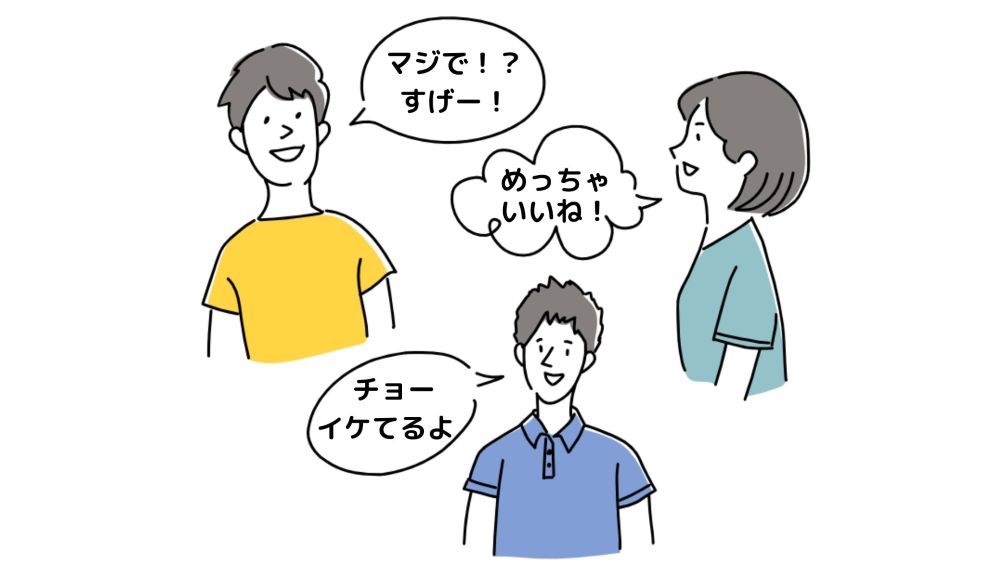Hello, Japanese learners! You have gotten used to daily conversations in Japanese but still struggle to follow along when native speakers talk to each other? The truth is, Japanese people frequently use slang. Knowing these commonly used slang words can help you make your conversations with Japanese friends more enjoyable. In this article, we’ll introduce the top 10 most frequently used Japanese slang words with examples. Be sure to memorise these phrases and try using them!
What is Japanese Slang?
The concept of slang is the same as in other countries: informal expressions used within specific communities or among young people. However, Japanese slang carries less of a “to be avoided” connotation compared to English slang, and even children sometimes use it. Additionally, it appears not only in daily conversations among friends and family but can occasionally be used in business settings among colleagues.
These slang words often emphasise surprise or humour and help close the distance between friends. A distinctive feature of Japanese slang is its frequent use of abbreviations, repetitive sounds, and altered endings to make the original words sound more fun or approachable.
Top 10 Most Common Japanese Slang Words
Meccha (めっちゃ)
Meaning “very” or “extremely,” this slang is widely used. A similar word is “超” [chou], which is also frequent but there are cases where it can be used in formal settings other than as slang. In casual situation, “超” is often written as “チョー” to convey the meaning “very.”
- Example: “今日はめっちゃ疲れた。”[Kyou wa meccha tsukareta.] – “I’m really tired today.”
- Example: “え?プレゼント?めっちゃ嬉しい!”[E? Purezento? Meccha ureshii!] – “What? A present? I’m so happy!”
- Example: “チョーお腹減った”[Chou onaka hetta.] – “I’m super hungry.”
Yabai (やばい)
This versatile slang can have both negative and positive meanings, expressing surprise, admiration, excitement, or a sense of danger. The concept of using this word is similar to how “fuck” is used in English, but it’s a relatively mild slang that even children use. Japanese people really use this word quite frequently.
Positive: Very good, wonderful, delicious, fun, happy, etc.
- Example: “このケーキ、やばい!食べてみな!”[Kono keeki, yabai! Tabete mina!] – “This cake is amazing! Try it!”
- Example: “見て!景色がやばいよ!”[Mite! Keshiki ga yabai yo!] – “Look! The view is incredible!”
- Example: “やばっ!めっちゃ楽しい!”[Yaba! Meccha tanoshii!] – “Wow! This is so much fun!”
Negative: Awkward, suspicious, shocking, dangerous, etc.
- Example: “やばい!遅刻だ!”[Yabai! Chikoku da!] – “Oh no! I’m late!”
- Example: “テストの点数、やばすぎる・・・”[Tesuto no tensuu, yabasugiru…] – “My test score is awful…”
- Example: “貯金がやばくなってきた・・・”[Chokin ga yabakunatte kita…] – “My savings are running low…”
Maji (マジ)
Meaning “really” or “seriously,” this slang is used to express genuine surprise or seriousness.
- Example: “マジで?!信じられない!”[Maji de?! Shinjirarenai!] – “Really?! I can’t believe it!”
- Example: “転校生、見た?マジでイケメンだよ!”[Tenkousei, mita? Maji de ikemen da yo!] – “Did you see the new student? He’s seriously handsome!”
Uzai (うざい)
Meaning “annoying” or “irritating,” this slang expresses annoyance towards people or situations.
- Example: “あの人、うざいんだけど。”[Ano hito, uzain dakedo.] – “That person is so annoying.”
- Example: “うざいからあっち行ってよ!”[Uzai kara acchi itte yo!] – “You’re annoying, go away!”
Kimoi (きもい)
Short for “気持ち悪い” [kimochi warui], meaning “disgusting,” this slang is used for things or people that are gross or when feeling unwell.
- Example: “あの虫、きもい!”[Ano mushi, kimoi!] – “That bug is gross!”
- Example: “車酔いしたかも・・・ちょっときもい。”[Kuruma yoi shita kamo… chotto kimoi.] – “I might be car sick… I feel a bit queasy.”
Ukeru (ウケる)
Meaning “funny” or “hilarious,” this slang is used when something is amusing.
- Example: “その話、ウケる!”[Sono hanashi, ukeru!] – “That story is hilarious!”
- Example: “あいつマジでウケるよね。”[Aitsu maji de ukeru yo ne.] – “That guy is seriously funny.”
Iketeru (イケてる)
Meaning “cool” or “stylish,” this slang is used to compliment someone’s appearance or style.
- Example: “その服、イケてるね!”[Sono fuku, iketeru ne!] – “Those clothes are cool!”
- Example: “新曲めっちゃイケてるなぁ”[Shinkyoku meccha iketeru naa.] – “The new song is really cool.”
Charai (チャラい)
Meaning “flashy” or “superficial,” this slang describes someone’s attitude or appearance as flashy and insincere.
- Example: “彼、ちょっとチャラいよね。”[Kare, chotto charai yo ne.] – “He’s a bit flashy.”
- Example: “チャラい男には気を付けな。”[Charai otoko ni wa ki o tsukena.] – “Be careful of flashy guys.”
Hekomu (へこむ)
Meaning “to feel down” or “depressed,” this slang is used when someone is feeling disappointed or discouraged.
- Example: “試験に落ちて、マジでへこんだ。”[Shiken ni ochite, maji de hekonda.] – “I failed the exam, and I’m really down.”
- Example: “へこんでる場合じゃないよ!”[Hekonderu baai janai yo!] – “There’s no time to be down!”
Gachi (ガチ)
Meaning “serious” or “genuine,” this slang is used to emphasise sincerity or seriousness.
- Example: “あの人、ガチで強いよ。”[Ano hito, gachi de tsuyoi yo.] – “That person is seriously strong.”
- Example: “今日からガチで勉強するわ。”[Kyou kara gachi de benkyou suru wa.] – “I’m going to study seriously from today.”
Slang-like Polite Greetings
Japanese has unique “slang-like polite forms” used in greetings. In Japanese, adding “desu” at the end of a sentence makes it more polite but young men especially, often prefer to use this polite expression in a slightly informal way.These casual-polite greetings can still be used with familiar seniors or bosses due to their polite nuance.
Uissu / Uissu (うっす、うぃっす)
A response meaning “yes.” It’s thought to be derived from the French “Oui” combined with the Japanese “desu,” which then got abbreviated.
- Example: “道具片付けといてね![Dougu katadzuketoi te ne!]」「うぃっす!”[Uissu!] – “Put away the tools!” “Got it!”
Chiissu / Chiwassu (ちっす、ちわっす)
An abbreviation of “konnichiwa” with “desu” added.
- Example: “ちわっす!お元気ですか?”[Chiwassu! Ogenki desuka?] – “Hi! How are you doing?”
Azassu (あざっす)
A casual abbreviation of “arigatou gozaimasu” (thank you).
- Example: “あざっす!助かりました!”[Azassu! Tasukarimashita!] – “Thanks! You really helped me!”
By learning Japanese slang, you can better understand native speakers’ conversations and communicate more smoothly in any situation. Use the slang introduced here and give them a try!


